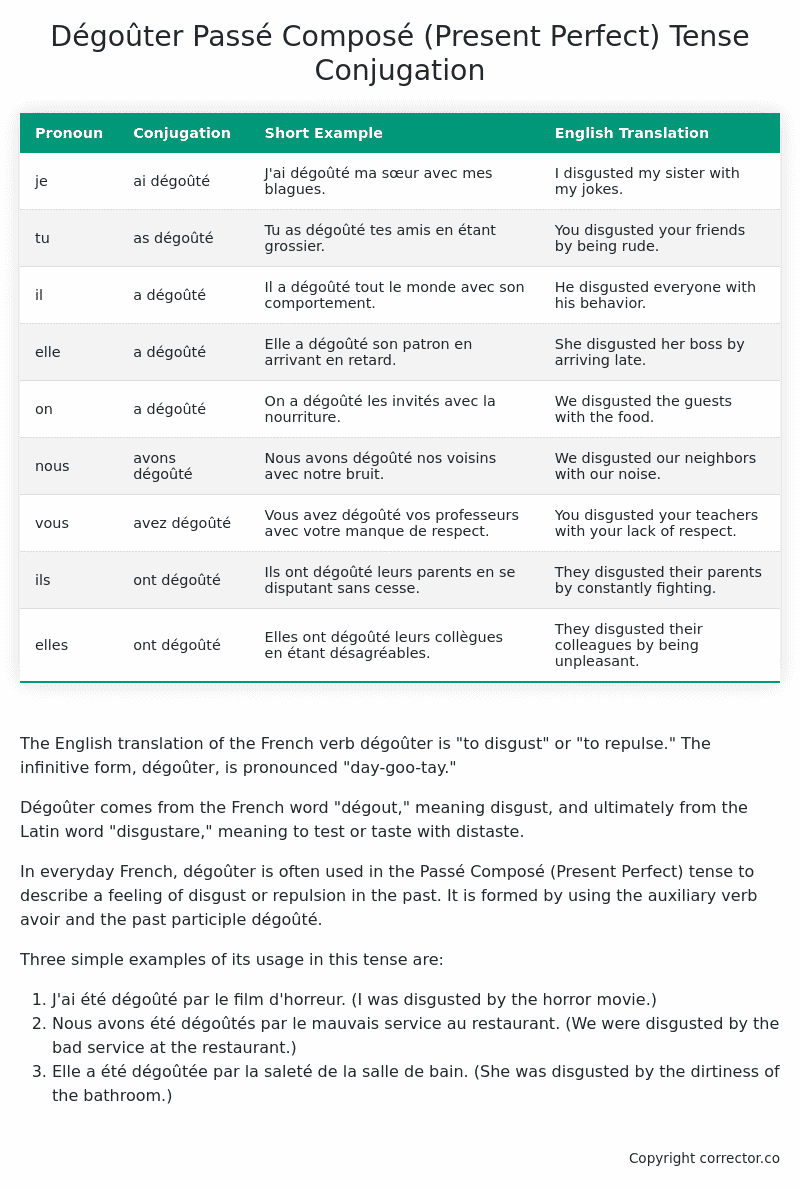Passé Composé (Present Perfect) Tense Conjugation of the French Verb dégoûter
Introduction to the verb dégoûter
The English translation of the French verb dégoûter is “to disgust” or “to repulse.” The infinitive form, dégoûter, is pronounced “day-goo-tay.”
Dégoûter comes from the French word “dégout,” meaning disgust, and ultimately from the Latin word “disgustare,” meaning to test or taste with distaste.
In everyday French, dégoûter is often used in the Passé Composé (Present Perfect) tense to describe a feeling of disgust or repulsion in the past. It is formed by using the auxiliary verb avoir and the past participle dégoûté.
Three simple examples of its usage in this tense are:
- J’ai été dégoûté par le film d’horreur. (I was disgusted by the horror movie.)
- Nous avons été dégoûtés par le mauvais service au restaurant. (We were disgusted by the bad service at the restaurant.)
- Elle a été dégoûtée par la saleté de la salle de bain. (She was disgusted by the dirtiness of the bathroom.)
Table of the Passé Composé (Present Perfect) Tense Conjugation of dégoûter
| Pronoun | Conjugation | Short Example | English Translation |
|---|---|---|---|
| je | ai dégoûté | J’ai dégoûté ma sœur avec mes blagues. | I disgusted my sister with my jokes. |
| tu | as dégoûté | Tu as dégoûté tes amis en étant grossier. | You disgusted your friends by being rude. |
| il | a dégoûté | Il a dégoûté tout le monde avec son comportement. | He disgusted everyone with his behavior. |
| elle | a dégoûté | Elle a dégoûté son patron en arrivant en retard. | She disgusted her boss by arriving late. |
| on | a dégoûté | On a dégoûté les invités avec la nourriture. | We disgusted the guests with the food. |
| nous | avons dégoûté | Nous avons dégoûté nos voisins avec notre bruit. | We disgusted our neighbors with our noise. |
| vous | avez dégoûté | Vous avez dégoûté vos professeurs avec votre manque de respect. | You disgusted your teachers with your lack of respect. |
| ils | ont dégoûté | Ils ont dégoûté leurs parents en se disputant sans cesse. | They disgusted their parents by constantly fighting. |
| elles | ont dégoûté | Elles ont dégoûté leurs collègues en étant désagréables. | They disgusted their colleagues by being unpleasant. |
Other Conjugations for Dégoûter.
Le Present (Present Tense) Conjugation of the French Verb dégoûter
Imparfait (Imperfect) Tense Conjugation of the French Verb dégoûter
Passé Simple (Simple Past) Tense Conjugation of the French Verb dégoûter
Passé Composé (Present Perfect) Tense Conjugation of the French Verb dégoûter (this article)
Futur Simple (Simple Future) Tense Conjugation of the French Verb dégoûter
Futur Proche (Near Future) Tense Conjugation of the French Verb dégoûter
Plus-que-parfait (Pluperfect) Tense Conjugation of the French Verb dégoûter
Passé Antérieur (Past Anterior) Tense Conjugation of the French Verb dégoûter
Futur Antérieur (Future Anterior) Tense Conjugation of the French Verb dégoûter
Subjonctif Présent (Subjunctive Present) Tense Conjugation of the French Verb dégoûter
Subjonctif Passé (Subjunctive Past) Tense Conjugation of the French Verb dégoûter
Subjonctif Imparfait (Subjunctive Imperfect) Tense Conjugation of the French Verb dégoûter
Subjonctif Plus-que-parfait (Subjunctive Pluperfect) Tense Conjugation of the French Verb dégoûter
Conditionnel Présent (Conditional Present) Tense Conjugation of the French Verb dégoûter
Conditionnel Passé (Conditional Past) Tense Conjugation of the French Verb dégoûter
L’impératif Présent (Imperative Present) Tense Conjugation of the French Verb dégoûter
L’infinitif Présent (Infinitive Present) Tense Conjugation of the French Verb dégoûter
Struggling with French verbs or the language in general? Why not use our free French Grammar Checker – no registration required!
Get a FREE Download Study Sheet of this Conjugation 🔥
Simply right click the image below, click “save image” and get your free reference for the dégoûter present perfect tense conjugation!

Dégoûter – About the French Passé Composé (Present Perfect) Tense
Formation of the Passé Composé
Set the auxiliary verb with either
Conjugate the auxiliary verb
Add the past participle
Common everyday usage patterns
Narrating Past Events
Sequential Actions
Describing Completed Actions
Interactions with other tenses
Imperfect Tense
Conditional and Future Tenses
Summary
I hope you enjoyed this article on the verb dégoûter. Still in a learning mood? Check out another TOTALLY random French verb conjugation!


